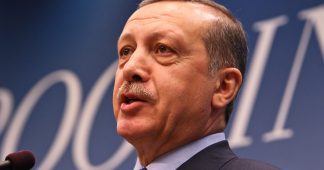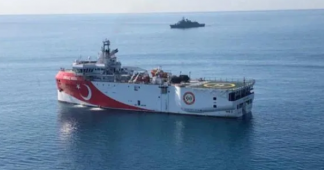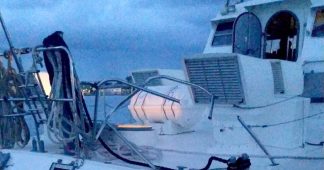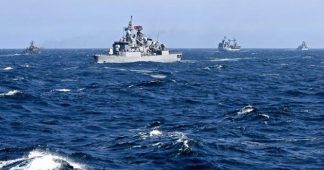by Burak Bekdil*
- At home, Turks are economically paralyzed: the official annual inflation rate is running at 48% (although independent researchers measure it at 114%); there are basic commodity shortages; gasoline, natural gas and electricity costs have doubled within a year; the national currency has lost half of its value against major Western currencies, and per capita GDP has been in freefall for the past seven years. The minimum wage, at barely $375 a month, is, after Albania, the second lowest in continental Europe. This gloomy picture has emerged just 16 months before Turkey’s Islamist autocrat, President Recep Tayyip Erdoğan, will go for an all-or-nothing election in June 2023.
- Like any other third-world autocrat, Erdoğan blames the economic collapse on “foreign powers plotting against Turkey’s graceful rise.”
- [Turkey’s top defense procurement official, Ismail] Demir’s office is running hundreds of armament programs. But observers have noticed a recent tendency to give prominence to naval programs targeting exclusively Greece, as Turkey does not have other littoral rivals.
- Turkish military and defense procurement officials are working day and night to run scores of other, smaller naval programs, despite the country’s severe economic constraints. This expansion reflects a political process of prioritizing guns over butter — all as theater for Turkish voters before they go to the ballot box.
To this day, the Turks are proud that their Ottoman ancestors had made the Aegean and Mediterranean Seas “a Turkish lake.” To this day, they lament that the Aegean is now widely a Greek lake and the Mediterranean is anything but a Turkish lake.
A century after the collapse of the Ottoman Empire and the birth of the modern Turkish Republic, Turkey’s irredentist Islamists are flexing their muscles not exactly to make the Aegean a Turkish lake again, but to distract the Turkish masses who many well be economically disgruntled into embracing the illusion that a neo-Ottoman Armada is back on the blue waters.
At home, Turks are economically paralyzed: the official annual inflation rate is running at 48% (although independent researchers measure it at 114%); there are basic commodity shortages; gasoline, natural gas and electricity costs have doubled within a year; the national currency has lost half of its value against major Western currencies, and per capita GDP has been in freefall for the past seven years. The minimum wage, at barely $375 a month, is, after Albania, the second lowest in continental Europe. This gloomy picture has emerged just 16 months before Turkey’s Islamist autocrat, President Recep Tayyip Erdoğan, will go for an all-or-nothing election in June 2023.
Like any other third-world autocrat, Erdoğan blames the economic collapse on “foreign powers plotting against Turkey’s graceful rise.” He often describes his unorthodox economic policies as an “economic war of independence.” He needs more than that, however, to make poverty-stricken Turks feel better. How about: “Our mighty navy is making the Aegean a Turkish lake again”? Not bad, especially if you think that the average Turk is a seventh-grade drop-out who would not bother to check the map and see that some Greek islands are swimming distance from the Turkish shore.
Feeling threatened, traditional Aegean rival Greece in January showcased its newly acquired defense capabilities by flying six Rafale fighter jets over the Acropolis hours after they arrived from France — along with a bill for €11.5 billion.
“The six planes that Greece bought are too few to face Turkey,” responded Turkish Defense Minister Hulusi Akar.
Echoing the minister, Turkey’s top defense procurement official, Ismail Demir, said that Turkey will keep working to have a stronger and more deterrent naval force in the “blue homeland,” a term Turks use for the Aegean and Mediterranean Seas.
Demir’s office is running hundreds of armament programs. But observers have noticed a recent tendency to give prominence to naval programs targeting exclusively Greece, as Turkey does not have other littoral rivals.
In December, the procurement agency SSB invited bids for the construction of three Turkish-designed Istanbul-class frigates to join five others under its national corvette (MILGEM) program. The frigates are designed for reconnaissance and surveillance, target identification, early warning, base and port defense, anti-submarine, anti-aircraft, surface warfare, amphibious operations and patrolling missions.
Turkey’s decision to have three frigates built — instead of one at a time of budgetary constraints — has a geo-strategic message. “The political authority is telling Turkey’s regional adversaries that it will not reconcile in geo-strategic disputes in the Aegean and eastern Mediterranean seas,” Özgür Ekşi, editor-in-chief of the defense news website TurDef, told this author.
There are other Turkish naval programs signaling a return to tensions on the Aegean Sea.
In August 2021, Turkish shipyard Ares said it designed and developed an unmanned anti-submarine warfare vessel. Ares said the ULAQ DSH/ASW successfully passed laser-guided firing tests. In October, Ares and defense technology company Meteksan Savunma launched a surface-warfare version of the ULAQ: Turkey’s first armed unmanned surface vessel. The system reportedly has a 400-kilometer range and can travel at speeds up to 65 kph.
In January, Turkey also commissioned into service the country’s first intelligence-gathering ship, TCG Ufuk, which will be jointly operated by the National Intelligence Organization and the Turkish Navy.
Also in January, the government announced that it would start the construction of a prototype ship that eventually will become part of a planned fleet of “Turkish-type assault boats.” Military analysts say these boats will “destroy/inactivate enemy assets at seas.”
Shortly after that, the Turkish Navy decided to replace its ageing inventory of about 350 U.S.-made Harpoon anti-ship missiles with the Atmaca, an indigenous anti-ship missile that reportedly has a range of over 220km, can cruise at an altitude as low as three meters and “navigate around islands and islets,” a not-so-hidden reference to their use in the Aegean Sea. It will be fitted aboard the Ada-class corvettes, the Istanbul-class frigates and the TF2000-class destroyers.
Then there is what will become the Turkish Navy’s jewel, the TCG Anadolu, a $1.2 billion landing helicopter dock. Ankara recently decided to convert this ambitious vessel into a drone carrier, as a Turkish drone manufacturer, Baykar, has been building TB3 drones exclusively for the Anadolu. The Anadolu is expected to become operational within a year.
Turkish military and defense procurement officials are working day and night to run scores of other, smaller naval programs, despite the country’s severe economic constraints. This expansion reflects a political process of prioritizing guns over butter — all as theater for Turkish voters before they go to the ballot box.
* Burak Bekdil, one of Turkey’s leading journalists, was recently fired from the country’s most noted newspaper after 29 years, for writing in Gatestone what is taking place in Turkey. He is a Fellow at the Middle East Forum.
Published atwww.gatestoneinstitute.org
We remind our readers that publication of articles on our site does not mean that we agree with what is written. Our policy is to publish anything which we consider of interest, so as to assist our readers in forming their opinions. Sometimes we even publish articles with which we totally disagree, since we believe it is important for our readers to be informed on as wide a spectrum of views as possible.










